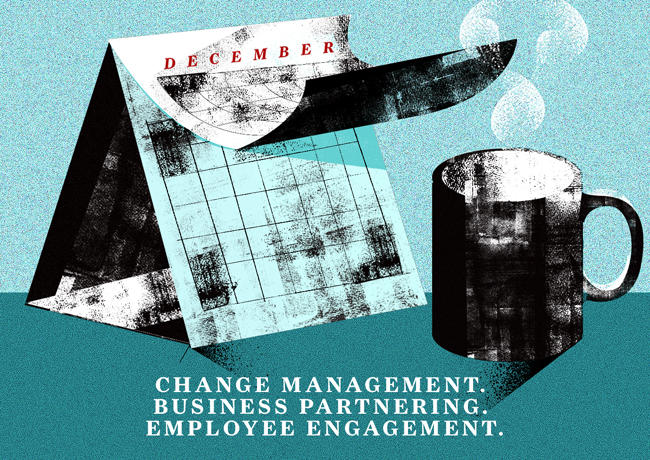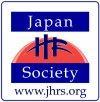by Jun Kabigting, JHRS Chief Community Officer and Alicor Panao, Editor-in-Chief, The HR Agenda
Change management. Business partnering. Employee engagement.
These are the “hot” issues that dominated JHRS members’ HR agenda for the year 2010 as reflected in the monthly polls that the Society regularly conducts amongst its members worldwide.
Throughout the year, we asked members their about views on a number of HR-related concerns ranging from gender discrimination to employee background investigation. Although these polls were not done in a statistically-exhaustive manner, the results do present very interesting findings and an indicative look into what Japan-focused HR professionals are thinking about current HR issues and challenges they are facing in the field.
JANUARY: Started the year with a fairly optimistic outlook...
This year has undoubtedly been momentous not only for the global economy in general, but also for the businesses who were compelled either to take drastic human resource adjustments or rethink strategic practices. In January, we asked our members how they saw the HR profession in 2010 and the result indicated a fairly optimistic outlook. Eight out of ten said this year would be a little better than 2009 for the HR profession. None said the prospects for the year would be so much better but the respondents were generally optimistic.
FEBRUARY: Gender discrimination in Japan...a reality!
For February, we decided to shift our focus away from the workplace to Japanese society in general. Does gender discrimination still exist in Japan? What do our members think? The overall sentiment it seems is that gender discrimination is still present although occurring on a “case-by-case” basis and largely dependent on the situation (67 percent). This makes sense when we consider that many of our respondents are people managers who are confronted with the question of who to hire and fire on a daily basis. But then again, does this mean that it is alright to discriminate as long as the situation calls for it? We will not hazard a guess, lest we tread on dangerous waters. Interestingly, about three in ten respondents believe there is gender discrimination “absolutely and all the time.” None of our respondents think that Japan is a gender-free society, nor do they think that acts of discrimination are intentional.
MARCH: Outsourcing HR – maybe or maybe not.
March has always been traditionally associated with welcoming ceremonies whether for a new employee in a company or a student who just passed a university’s entrance exam. So we asked members what they think about outsourcing and whether it would benefit the organization if some or all of HR functions are outsourced. Outsourcing, in recent years, has become a buzzword of sorts for many organizations looking at it as a potential delivery option for some of their activities. About six in ten respondents in the poll say they have no qualms about outsourcing HR functions, and are, in fact, doing it already. The remaining 40 percent are made up of those who are not yet quite certain about HR outsourcing, those who insist that HR has to remain in-house, and those simply do not mind whether HR is outsourced or not. In large organizations, of course, it is not unusual to see operational HR aspects outsourced while retaining control over HR strategy and decision-making.
APRIL: Teams and Teamwork: Strength in Differences
The April poll focused on teams and teamwork. Sixty-seven percent of respondents generally regard a team as one whose strength lies in differences, not in similarities. None of the respondents believe teamwork is just all about delegating work and doing one’s part. Nor do they think that just because team members all are determined to win, that already makes for a good team.
MAY: HR in the Hiring Game – but for a different reason!
For May, we decided to tackle a rather controversial issue that has emerged with the transformation of the workplace. For instance, as mentioned earlier, some organizations are starting to delegate one or more business processes to an external business provider, who in turn, manages and administers the selected processes according to a defined and measurable performance metric. Outsourcing arrangements in the context of HR varies from virtually all HR processes to just a select specific component such as payroll or staffing.
So must HR remain in the hiring/recruitment business? About 47 percent of our respondents believe HR is still important in the hiring process to screen resumes, schedule interviews, and deal with headhunters. But 21 percent believes HR should stay away from the hiring process unless it “earns” its right in the hiring table. There are also those who believe (roughly 16 percent) that HR should devolve recruitment to hiring managers completely. Of course, taking such a bold measure is more difficult in real terms. In fact, some executives and human resources experts take the outsourcing trend with a grain of salt. They argue that a number of HR tasks are so closely entwined with the culture of a company, that to let them go may run the company at risk of sacrificing its own way of doing things.
JUNE: Money is not everything.
What about rewards? How do companies recognize achievement? The result of our June poll indicates that in about four out of ten companies, the most typical reward would be a pat on the back and some non-monetary rewards. About three in ten companies resort to the carrot-and-stick approach. About two in ten encourage achievement by rewarding employees money, lots of them. Of course there are also companies who believe that the best reward is the fact that employees get to keep their jobs — an option that has become more and more common with the lingering economic crunch.
JULY: HR as “Business Partners” — really?
We also asked members what they think about HR becoming a business partner in their organizations. Six in ten respondents agree that HR should assume the role of a business partner and must give value or give notice. There are, of course, those who are wary if HR can be relied upon to be a business partner and prefers to look into the idea as a future prospect. There are also respondents who insist that HR must still do the transactional aspect of human resource management even though it must play the role of a business partner.
AUGUST: “Wait and see” Attitude towards Change
These trends are all part of the changes taking place in the workplace. But then again adapting to change is an entirely different story. For August, we asked members to describe how people in their organizations respond to change. Their response, though hardly surprising, is quite revealing. A good number of respondents (43 percent) say that people meet change as bystanders, “hopelessly hoping that things will stay the same.” There are also those who see themselves as victims (29 percent) and are wary they may not cope. Interestingly, the critics (those who rally others to resist change, 14 percent) are only as few as the navigators (those who are completely cool about the idea of change, 14 percent) and there appears to be not so many of them in our respondents’ organizations.
SEPTEMBER: Communicate, communicate, communicate...
As for issues in cross cultural communication, six in ten respondents consider those arising from differences in communication styles as the most difficult to address. The rest consider differences in attitudes towards conflict as the most difficult.
OCTOBER: Trust but Verify
Last October, we asked members if their organizations conduct background or reference checks of current and prospective employees. About six in ten respondents say they sometimes do, depending on the type and level of position. Three in ten respondents say they do it all the time across all levels and positions. But there are also those who do not at all conduct background checks (11 percent), saying that their hiring and selection process is already good as it is.
NOVEMBER: “Conditionally engaged”
For November, we wanted to know the level of engagement of employees in our members’ respective organizations. Are employees very engaged and show deep commitment to achieve the goals of the company? Or are they actively disengaged to the point of infecting others? Six in ten respondents say employees in their organizations are conditionally engaged; in other words, they just go with the flow. There are also those who say their employees are very engaged and love their work. But there are also those who say their employees are so actively disengaged they are no better than saboteurs. Interestingly, none of our respondents say they have employees who are apathetic (non-engaged or the indifferent type) or those that are quietly disengaged (who appear committed and just keep their disengagement to themselves).
Whether the above poll results reflect a change in paradigm or actual evidence of the current state of practice, of course, is debatable and we do not make any claims. Nevertheless, they show at the very least that HR as a concept learned in the classroom can be quite different in practice...especially in Japan.
So the next time you receive the HRA newsletter or visit the JHRS website, please do take 5 seconds of your time to answer our poll of the month and let your voice be heard and become part of a collective consciousness shaping the HR practice in Japan.
Other posts by The Japan HR Society:







